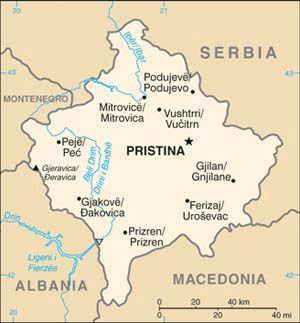Kosovo: Sharing A Conundrum – Analysis
Beset with enormous – perhaps insurmountable – economic and political problems of their own, the Europeans seem uninterested and/or unable to support real solutions in the central Balkans.
By Gerard M. Gallucci
As thing now stand, Serbia, Kosovo and the northern Kosovo Serbs are in the same boat. Intentionally or not, the EU and US are subjecting them all to forces that leave them on collision courses with each other, as well as allowing the ‘Euro-Atlantic’ alliance to keep them on the doorstep of Europe rather than letting them in.

Beset with enormous – perhaps insurmountable – economic and political problems of their own, the Europeans seem uninterested and/or unable to support real solutions in the central Balkans. They meekly follow the US’s lead, despite Washington’s own unrealistic approach to overcoming the region’s lingering ethnic differences. In Bosnia, the EU/US axis seeks to pursue the holy grail of centralization, despite the three entities appearing comfortable with the current situation in which they run their own affairs. (Sarajevo, of course, would not mind more centralism with it at the center.) The EU’s feckless approach to Macedonian membership – waiting for the Greeks -offers nothing there either.
Meanwhile, the EU is beating Serbia over the head with conditions for membership that at least some Europeans know full well are unrealistic. The Quint has managed to keep Ramush Haradinaj tied up in court while dangling over prime minister, Hashim Thaci, the sword of corruption and organ trafficking charges. The US keeps promising Pristina the moon while offering nothing more than destabilizing theatrics in the north. This amounts to an easy way to block both Serbia and Kosovo moving into Europe – member candidacy for Serbia, visa-free travel for Kosovo.
Serious efforts to help resolve the north Kosovo issue – through finding a compromise solution – and preparing Kosovo for travel would take time and resources that perhaps the Quint capitals just don’t want to spare. So, left to their own devices, Kosovo, Serbia and the northern Serbs will either find their own way to dance together or be left to hang alone.
Finding the key nut to crack would not be difficult for the EU if it were serious. Just look at the position in which they have left Serbia’s president, Boris Tadic. Trapped by EU demands he cannot meet and facts being created on the ground in north Kosovo, he has no clear alternatives and therefore no clear policy. He would make any deal he could but cannot just give away Kosovo or the north. The deal the Germans and US seem to want – accepting Kosovo customs and taking down the barricades – the northern Serbs would not let him deliver. They appear more open to compromise than ever. They will, however, not simply surrender and don’t trust anyone, including Tadic. One may encourage the northerners to take their barricades down and be open to new ideas but they are not thinking of compromise just now as all they see are hands raised against them.
What could the EU do differently? It could back off its effort to force Kosovo customs to the boundary crossings in favor of some status neutral approach. This would allow the northern Serbs to bring down their barricades while Belgrade continues to work through the EU dialogue with Pristina on further practical steps forward. All this would justify the eminently sensible step of granting Serbia candidacy in December. The Europeans could also drop the confrontational approach that seems to be favored by the US, and instead seek to support Kosovo through a process of getting it ready for its own movement into the EU.
As of now, it seems the only way for Kosovo and Serbia to get serious help from Europe is to continue drifting toward conflict. North Kosovo would be the trigger. How to avoid this is their shared conundrum. Maybe they themselves need to take the first steps to back away from the current stalemate. And maybe the Europeans should stop looking for a ‘know-nothing’ exit strategy from the Balkans and instead work on bringing it in from the cold.
Gerard M. Gallucci is a retired US diplomat and UN peacekeeper. He worked as part of US efforts to resolve the conflicts in Angola, South Africa and Sudan and as Director for Inter-American Affairs at the National Security Council. He served as UN Regional Representative in Mitrovica, Kosovo from July 2005 until October 2008 and as Chief of Staff for the UN mission in East Timor from November 2008 until June 2010. Gerard is also a member of TransConflict’s Advisory Board.

Excellent article Mr. Gallucci. It wouldn’t break the paradigm to create a “Customs free zone” for the North, given the special situation.